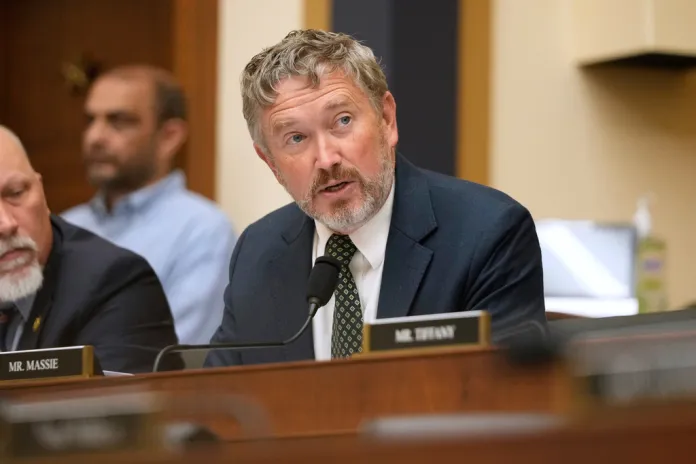Pennsylvania GOP freshman eyes next fight after Medicaid win
Rep. Rob Bresnahan, a Pennsylvania Republican, has quickly made his mark in Congress following his election victory in November over longtime Democrat Rep. Matt Cartwright. Now in his fifth month as a freshman congressman, Bresnahan is focusing on representing his constituents in northeastern Pennsylvania, notably regarding issues related to Medicaid, wich plays a meaningful role in his district.About 27% of his constituents rely on Medicaid, the second-highest rate in Pennsylvania. bresnahan worked to limit cuts to Medicaid during negotiations over a major spending bill, emphasizing the necessity to protect benefits for vulnerable populations and to address the needs of struggling hospitals in his district.
Looking ahead, Bresnahan is setting his sights on infrastructure improvements. He highlights the urgent need for streamlining permitting processes to repair structurally deficient bridges, a significant concern in Pennsylvania. With a strong belief in the importance of infrastructure, he is actively involved in initiatives aimed at reforming the bureaucratic obstacles that delay essential projects. As a member of the newly formed Build America Caucus, he advocates for reducing red tape to expedite construction and ultimately save taxpayer money.
Pennsylvania GOP freshman eyes next fight after Medicaid win
Five months into his freshman year in Congress, Rep. Rob Bresnahan (R-PA) has learned how to elbow his way into key negotiations with decision-makers.
Bresnahan, who flipped a blue seat in November by beating incumbent Rep. Matt Cartwright, knows his career in Congress depends on delivering for his northeastern Pennsylvania district that includes Scranton, former President Joe Biden’s hometown.
Working for his constituents means muscling his way into the conversations with powerbrokers who call the shots. On Monday, Bresnahan was the only freshman among a small group of GOP lawmakers to join President Donald Trump at the White House for an event on new savings accounts for children.
Bresnahan, who is only 35 in Congress and started working at his family business, Kuharchik Construction, at age 19, said he is used to punching above his weight.
“I’m traditionally accustomed to being the youngest guy in the room, but at the end of the day, we all have a job to do, and my job, at least the way that I perceive it, is to represent northeastern Pennsylvania,” said Bresnahan, a former electrical contracting company CEO.
As House Republicans battled to negotiate an agreement to advance Trump’s tax and spending bill, the freshman Pennsylvania Republican was publicly opposed and worked behind the scenes to advocate against steep cuts to Medicaid.
“Listen, we’re all for getting rid of waste, the fraud, the abuse, the illegal aliens, absolutely. But when it comes to providing the benefits for the people of northeastern Pennsylvania that deserve them, it was nonnegotiable, and I was very clear and adamant that this was not going to be something that we would support,” Bresnahan told the Washington Examiner during an interview.
About 27% of Bresnahan’s district relies on Medicaid, the second highest out of all congressional districts in Pennsylvania, making the issue a key priority for his district.
The Pennsylvania Republican was also against reductions to the federal Medicaid assistance percentage, known as FMAP, pushed for by fiscal hawks as a means of reducing government spending due to the effect they would have had on two hospitals in his district that are struggling to stay open.
“We have a hospital situation taking place in Lackawanna County right now, where Commonwealth [health system] is in the process of potentially closing two of our hospitals, and we need to do everything within our power to make sure there’s a continuity of care for the epicenter of our district. And we would not feel that we were doing right for the district if there were some kind of reconfiguration of the provider tax,” Bresnahan said, adding there was a proposal on the table during a meeting he attended with Speaker Mike Johnson (R-LA) and other GOP members to reduce the provider tax over eight years.
Bresnahan continued, “There were gigantic savings in there. But again, there would be long-term consequences to our ultimate beneficiaries that deserve these benefits, as well as our hospital systems. And that wasn’t something that I was willing to wave on.”
In the monthslong negotiations over the massive spending bill, Bresnahan attended several meetings, including one late-night meeting at the White House, in which he and other GOP centrists expressed their opposition to any reductions to Medicaid spending, including to the federal Medicaid Assistance percentage.
He was also one of 12 Republicans who sent a letter to House GOP leadership declaring that they would not support a final reconciliation bill that would reduce Medicaid coverage for vulnerable populations.
Bresnahan and GOP centrists were successful in limiting cuts to Medicaid, fighting off a last-minute effort from conservative holdouts in the House Freedom Caucus who wanted to see steeper cuts.
Now, though, as the reconciliation bill sits in the Senate, Bresnahan is eyeing his next project: permitting reform to streamline infrastructure projects.
“I’m a big believer in infrastructure, and I’m very honored to serve as the vice chairman of highway transit. I think 25% of our district has structurally deficient bridges,” Bresnahan said. “There’s a lot that goes into infrastructure, but in order to have a functioning society … that foundation needs to be proper and adequately reinvested in.”
Pennsylvania is second in the nation in structurally deficient bridges, according to data collected by the American Road & Transportation Builders Association. However, because of the current permitting process in the United States, it can take years for a bridge to get fixed, Bresnahan said, referring to one bridge in his district that is expected to take years to reopen.
“And that means a main artery, a main thoroughfare leading in and out of our community, will be down for close to a decade, and it’s because of the permitting process, it’s the environmental studies, it’s the review periods, and I don’t think that’s acceptable,” Bresnahan told the Washington Examiner.
CONGRESSIONAL BASEBALL GAME: HOW TO WATCH AND WHAT TO KNOW
Bresnahan joined the newly formed Build America Caucus last month, which is aimed at making permitting and transmission reform, incentivizing the building of more homes, streamlining requirements for infrastructure projects, and “cutting red tape.”
“Ultimately, time is what makes any job the most unpredictable but also increases the cost exponentially,” Bresnahan said. “So getting shovels in the ground faster and getting these things built are ultimately going to save the taxpayer money, and it’s going to produce a result and a product significantly faster. So getting, again, government out of the way.”
The Washington Examiner has reached out to Johnson’s office and the White House for comment.
" Conservative News Daily does not always share or support the views and opinions expressed here; they are just those of the writer."




